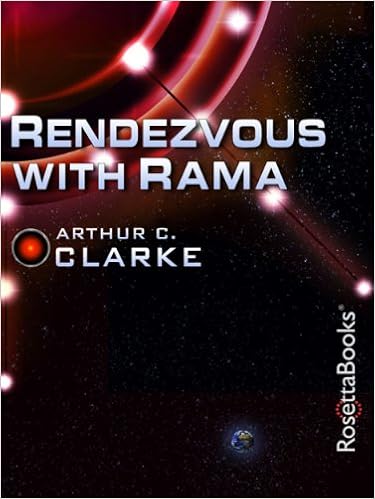Well this month we're doing another Arthur C. Clarke month by looking at the four books of the Rama series. ''But Kalpar!'' my readers are probably already shouting. ''All months have at least four Thursdays in them because of how the Gregorian Calendar works! If the Rama series is only four books long, couldn't you have talked about it any month you liked?''
Well, okay, yes, dear and gentle reader you are correct in that regard. However, I like doing a history book the last week of the month so since September has five Thursdays that means I can do four books and then talk about something historical the last week.
Rendezvous with Rama is a somewhat short novel about the sudden appearance of an unidentified object entering the solar system. Initially it's tagged as a comet, asteroid, or other piece of space debris coming in from the outer edges. However radar arrays soon find out that it's much larger than initially anticipated and it's christened Rama, prompting astronomers to start taking notice of it. Which is when things start getting weird. Scientists realize that Rama a natural object at all. It is without a doubt an artificial object coming from outside the solar system. This of course only fans the flames of curiosity and a solar survey ship is sent on an emergency re-route so that at least some humans will be able to investigate Rama before it disappears from the solar system entirely.
And that's, basically the plot. A mysterious obviously artificial object comes from outside the solar system and humans go and investigate said object and it's...well, weird. This is honestly the biggest complaint I have with the book is that it doesn't go much beyond, ''Man, this object from beyond the solar system. It's pretty weird and mysterious, right?'' Like, there are a lot of ways that Clarke makes Rama look strange any mysterious and a lot of things happen that the human characters don't understand. They compare it a couple times to unearthing a tomb from a lost civilization, which is a fairly apt metaphor. But the plot of the book doesn't really go beyond, ''Hey look, this thing is strange and mysterious.''
That's okay for starting a book off, I'll admit. People like a good mystery and I was interested myself in finding out what the heck this thing was and why it came to our solar system of all places. But ultimately the adventure ends up raising more questions than answers. And on the one hand, that makes it very good hard science fiction. For my readers who aren't aware, science fiction tends to get classified as ''hard'' or ''soft'' on a scale depending on how closely it hews to what's scientifically possible. So hard science fiction tends to stick with what's known or possible and usually only invents technologies that are possible or probable, but may not have been invented or developed yet. Soft science fiction tends to take an ''anything goes'' approach and technology indistinguishable from magic is the rule of the day. Although this is really a brief and imperfect summary.
So Rendezvous with Rama is good hard science fiction. People have to worry about light-speed limits on communications, making interplanetary conference calls difficult if not impossible. The Endeavor, the ship sent to investigate Rama, has to worry about having enough fuel to make its orbits and actually has to steal fuel from other ships to match Rama's orbit in time. Clarke tends to stick very close to what's possible in this story. And honestly, an obviously artificial craft coming from outside our solar system which we decide to investigate? That's probably going to leave us with more questions than answers. Pretty much all efforts at scientific research have left us with more questions than answers, which leads us to further research. So in that way, Rendezvous with Rama is very true to life.
However, I don't know if that makes it terribly interesting to read. Yeah, it's neat to see people out in space doing space things and investigating a mysterious ship, but I kind of wish that there had been at least some sort of resolution to the questions that are raised. Who built the ship? Why did they build it? Why did they send it to our solar system? Those are pretty much the first questions anyone's asking and by the end of the book we're left with no conclusive answers.
The book ends with a very obvious sequel hook and I was honestly kind of annoyed by that. Yes, I have the other three books set up so that I can see if Clarke actually answers the questions I want answered, but it almost feels like he's deliberately teasing the reader by making them wait until the next book, or even the book after that.
Overall, this book's okay. It's well-written hard science fiction and Rama's definitely strange and mysterious. But the book doesn't seem to move beyond, ''Oh look, it's strange and mysterious!'' I think I'll just have to see where the series goes from here and if it improves.
- Kalpar


No comments:
Post a Comment